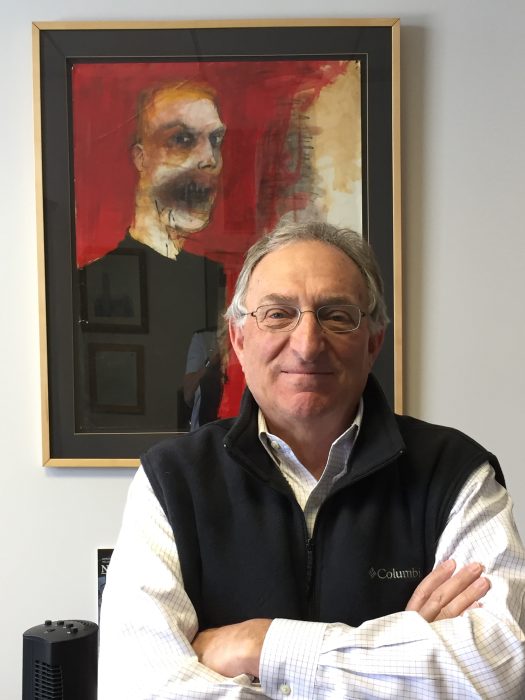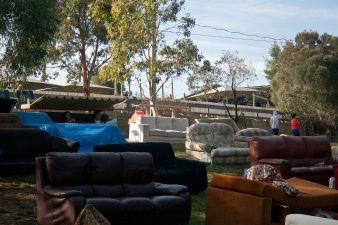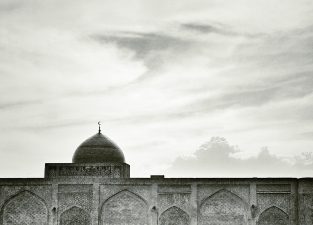Nonfiction
| Diary
Fixed Income
The day my father retired, he dubbed it a privileged occurrence, joyous even. Buoyant. The man worked on his vocabulary, memorized poems, in particular those that rhymed. Fond of Longfellow and Robert Service, he could by heart quote “Hiawatha” and “The Cremation of Sam McGee.” He dodged games like Scrabble or Boggle and puzzles of […]
The day my father retired, he dubbed it a privileged occurrence, joyous even. Buoyant. The man worked on his vocabulary, memorized poems, in particular those that rhymed. Fond of Longfellow and Robert Service, he could by heart quote “Hiawatha” and “The Cremation of Sam McGee.” He dodged games like Scrabble or Boggle and puzzles of the crossword sort, as if these were trivial means to acquiring language. Context was his game, though, in contradiction, when he gave me books to read—Edgar Rice Burroughs (Tarzan and Mars), James Oliver Curwood (grizzlies and Canucks), Booth Tarkington (Penrod and friends)—he advised that should I come upon a word I didn’t know to just skip it. I don’t recall a dictionary in the house. Forty years he drudged in mines and smelters, arriving each day to an unswept room where he changed into corroded clothes and slimed boots, descending to work beneath the earth’s surface. He wore an abused hardhat. Upon retirement, he bought a shotgun he’d heft, sight, and hand about. He kept it clean and oiled. He owned chainsaws, but he bought a new one. Kept it oiled. When my father died, my younger brother (named James for the alcoholic grandfather) stole both tools right after the funeral, backing his truck up under the carport, then sliding off before eating what the church had brought (casseroles and JELL-O). A venison man, Jim owned firearms, but as a family, we sensed, without proof, that he’d used Dad’s when he killed himself seven years after our father had passed. James II, as it turned out, like his namesake, was a welcoming site for cancer. A mechanic and master welder, he was a high-functioning drunk who also broke horses. He blamed what happened to his pancreas on diesel and solvents. On the day Jim shot himself, he’d received his second supply—so we were told—of morphine patches. An unfulfilled goal for Jim was to write the definitive text on how to hunt, prepare, and cook up duck. Jim is buried in Idaho. My father rests some four hours north in Montana, an adjacent plot arranged previously for my mother who, when she swiftly remarried, taught me all I’d never quite processed when I’d first read Hamlet. Despite the second marriage, she now rests beside my father, reinstated. He’d had a stone prepared before his death. All that had to be added was the death date, to follow the hyphen from the birth date: 1925-. Beloved Wife and Mother. A sweet-voiced alto, my mother was the typing champion of her high school. She played clarinet and, late in life, taught herself piano on a secondhand upright that she had tuned once a month. A thin bent man, known in our house only as The German, came with a bag of silver tuning forks and the scent of cabbage. He’d fought in the Great War for the U.S. and marched in the Fourth of July parades wearing his wool uniform and metal helmet. He threw paper poppies to the crowd. Besides tuning pianos, The German painted houses and one summer my then teenaged brother helped him paint a porch and garage. It was my father who told me that The German was Jewish. Wouldn’t be polite to call him that though, my father informed. I believe he prefers to be thought of as a German who fought the Krauts. When Jim drove up for our father’s funeral, he loitered outside, where he nipped whiskey and smoked and wailed. It was a Mormon affair, my father having been a devout member of that sect—in fact, a Bishop. Despite his high church standing and his belief, my father displayed patience with drunks, as if he saw earnest virtue in their focus. Proud of my four years of college—he’d completed two—my father’d often ask, before he retired, what my salary came to. I’d been promoted to Major after 11 years in the U. S. Air Force the summer my parents visited in Washington D.C. When he saw the new rank, my father asked what a major collected. His term was compensation. When I announced the amount, I realized I’d named a figure that exceeded his after all the years he’d humped in the mines, a mile and more underground. I was half his age at the time and wore clean clothes to my workplace. He never again inquired as to what I was paid. If you peered into the fridge in the house I grew up in, what you would have found was both butter and margarine. The butter was my father’s, the margarine for the rest of us. Whether my father thought butter unhealthy for us, or whether he thought the spread too dear, I haven’t a clue. I know he savored cream and red meat and butter, and that, in the end, his slathered heart struck back four times in fourteen hours and he died. After the shotgun and chainsaw, my father sprang for a car. He’d long craved a Buick, so he bought one. When he detected that the GM engine was a brother Chevy, he felt duped, or, in his word, snookered. “Snookered, snookered” he said again and again—the alien motor lodged in his craw thereafter. He’d paid cash for the phony canary sedan. He took a loss when he traded it in. I drive Toyotas and claim no weapons. I’ve owned a chainsaw, but it was a mini-electric, hardly an instrument to haul to the woods. Now 70, and nine years beyond my father when he retired, I still work, but thinking of calling it quits. I’d worked a mile deep—the 5200 level of the Mountain Con Mine—the summer between high school and college. In 1964, a day’s pay in the mines was 21 dollars (at a time when gasoline went for four gallons a buck). What I realize today is that the amount normally carried in my checking account exceeds what my father paid for the family abode (and it took him 30 years to do it). Am I to feel pride or embarrassment? When I retire, if I retire, I have it stuck in my nut to purchase a cedar canoe from the just-arrived Orvis catalog. Were my father here, he’d be intrigued to know that at 58 lbs, the canoe accommodates passengers and supplies combining to weigh 650. “Displacement,” he’d say, not to explain it, but to say it.
The day my father retired, he dubbed it a privileged occurrence, joyous even. Buoyant. The man worked on his vocabulary, memorized poems, in particular those that rhymed. Fond of Longfellow and Robert Service, he could by heart quote “Hiawatha” and “The Cremation of Sam McGee.” He dodged games like Scrabble or Boggle and puzzles of the crossword sort, as if these were trivial means to acquiring language. Context was his game, though, in contradiction, when he gave me books to read—Edgar Rice Burroughs (Tarzan and Mars), James Oliver Curwood (grizzlies and Canucks), Booth Tarkington (Penrod and friends)—he advised that should I come upon a word I didn’t know to just skip it. I don’t recall a dictionary in the house. Forty years he drudged in mines and smelters, arriving each day to an unswept room where he changed into corroded clothes and slimed boots, descending to work beneath the earth’s surface. He wore an abused hardhat. Upon retirement, he bought a shotgun he’d heft, sight, and hand about. He kept it clean and oiled. He owned chainsaws, but he bought a new one. Kept it oiled. When my father died, my younger brother (named James for the alcoholic grandfather) stole both tools right after the funeral, backing his truck up under the carport, then sliding off before eating what the church had brought (casseroles and JELL-O). A venison man, Jim owned firearms, but as a family, we sensed, without proof, that he’d used Dad’s when he killed himself seven years after our father had passed. James II, as it turned out, like his namesake, was a welcoming site for cancer. A mechanic and master welder, he was a high-functioning drunk who also broke horses. He blamed what happened to his pancreas on diesel and solvents. On the day Jim shot himself, he’d received his second supply—so we were told—of morphine patches. An unfulfilled goal for Jim was to write the definitive text on how to hunt, prepare, and cook up duck. Jim is buried in Idaho. My father rests some four hours north in Montana, an adjacent plot arranged previously for my mother who, when she swiftly remarried, taught me all I’d never quite processed when I’d first read Hamlet. Despite the second marriage, she now rests beside my father, reinstated. He’d had a stone prepared before his death. All that had to be added was the death date, to follow the hyphen from the birth date: 1925-. Beloved Wife and Mother. A sweet-voiced alto, my mother was the typing champion of her high school. She played clarinet and, late in life, taught herself piano on a secondhand upright that she had tuned once a month. A thin bent man, known in our house only as The German, came with a bag of silver tuning forks and the scent of cabbage. He’d fought in the Great War for the U.S. and marched in the Fourth of July parades wearing his wool uniform and metal helmet. He threw paper poppies to the crowd. Besides tuning pianos, The German painted houses and one summer my then teenaged brother helped him paint a porch and garage. It was my father who told me that The German was Jewish. Wouldn’t be polite to call him that though, my father informed. I believe he prefers to be thought of as a German who fought the Krauts. When Jim drove up for our father’s funeral, he loitered outside, where he nipped whiskey and smoked and wailed. It was a Mormon affair, my father having been a devout member of that sect—in fact, a Bishop. Despite his high church standing and his belief, my father displayed patience with drunks, as if he saw earnest virtue in their focus. Proud of my four years of college—he’d completed two—my father’d often ask, before he retired, what my salary came to. I’d been promoted to Major after 11 years in the U. S. Air Force the summer my parents visited in Washington D.C. When he saw the new rank, my father asked what a major collected. His term was compensation. When I announced the amount, I realized I’d named a figure that exceeded his after all the years he’d humped in the mines, a mile and more underground. I was half his age at the time and wore clean clothes to my workplace. He never again inquired as to what I was paid. If you peered into the fridge in the house I grew up in, what you would have found was both butter and margarine. The butter was my father’s, the margarine for the rest of us. Whether my father thought butter unhealthy for us, or whether he thought the spread too dear, I haven’t a clue. I know he savored cream and red meat and butter, and that, in the end, his slathered heart struck back four times in fourteen hours and he died. After the shotgun and chainsaw, my father sprang for a car. He’d long craved a Buick, so he bought one. When he detected that the GM engine was a brother Chevy, he felt duped, or, in his word, snookered. “Snookered, snookered” he said again and again—the alien motor lodged in his craw thereafter. He’d paid cash for the phony canary sedan. He took a loss when he traded it in. I drive Toyotas and claim no weapons. I’ve owned a chainsaw, but it was a mini-electric, hardly an instrument to haul to the woods. Now 70, and nine years beyond my father when he retired, I still work, but thinking of calling it quits. I’d worked a mile deep—the 5200 level of the Mountain Con Mine—the summer between high school and college. In 1964, a day’s pay in the mines was 21 dollars (at a time when gasoline went for four gallons a buck). What I realize today is that the amount normally carried in my checking account exceeds what my father paid for the family abode (and it took him 30 years to do it). Am I to feel pride or embarrassment? When I retire, if I retire, I have it stuck in my nut to purchase a cedar canoe from the just-arrived Orvis catalog. Were my father here, he’d be intrigued to know that at 58 lbs, the canoe accommodates passengers and supplies combining to weigh 650. “Displacement,” he’d say, not to explain it, but to say it.
Donald Anderson’s collection Fire Road won the John Simmons Short Fiction award. His most recent book is Gathering Noise from my Life: A Camouflaged Memoir.






